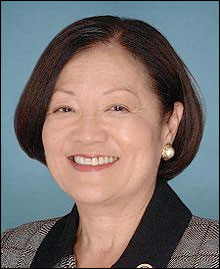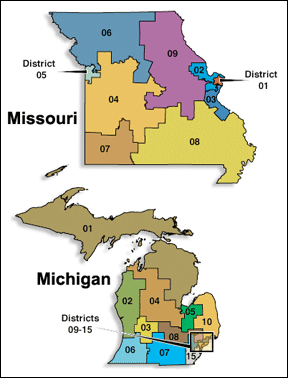Missouri: The polling was right. During the final week of the Missouri Senate Republican primary, late surveys from research organizations such as Public Policy Polling detected Rep. Todd Akin (R-MO-2) mounting a serious come-from-behind surge. Akin, who billed himself as the campaign’s “true conservative,” had not led for any substantial period of time, but his campaign peaked at exactly the right moment. Last night, Akin notched a 36-30-29 percent GOP nomination win over St. Louis businessman John Brunner and ex-state treasurer Sarah Steelman, respectively.
The victory sends Akin to the general election against first-term incumbent Claire McCaskill (D), who may be the weakest Democrat incumbent currently seeking re-election. While Sen. McCaskill’s party leaders and political activists believe Akin is the best Republican for her to run against, the Missouri voting trends may tell a different story come November. This will be a hard-fought campaign and one in which the presidential contest will play a major role. The real race begins today.
Turning to the paired House races, in Missouri’s St. Louis-anchored 1st Congressional District, veteran Rep. Lacy Clay (D) easily turned back a challenge from fellow Democrat, Rep. Russ Carnahan (D-MO-3) who chose to run in a contested primary after his seat was collapsed in reapportionment. Clay was renominated 63-34 percent, amongst a turnout of about 90,000 voters. Late polling was predicting a decisive Clay win and such occurred mostly due to overwhelming support within the African-American community.
Michigan: As expected, former Rep. Pete Hoekstra (R-MI-2) scored an easy 54-34 percent victory over charter school advocate Clark Durant in the contest for the Senate. The retired congressman will now face two-term incumbent Debbie Stabenow in what will be a major uphill battle. Sen. Stabenow is the clear favorite for re-election.
In Detroit, also as local polling predicted, two-term Rep. Gary Peters (D-MI-9), who was paired with veteran Rep. Sander Levin (D-MI-12) in the new 9th District but chose to run in the Detroit/Oakland County CD because he believed he could take advantage of a split within the African-American community, saw his strategy bear fruit last night. Mr. Peters defeated freshman Rep. Hansen Clarke (D-MI-13) 46-36 percent in a field of five candidates, three of whom are African-American.
In the adjacent 13th District, 24-term Rep. John Conyers, who will now likely complete at least 50 years of service in the House, defeated a field of four challengers, garnering a clear majority 57 percent of the vote. State Sen. Glenn Anderson, Mr. Conyers’ strongest opponent, only managed 15 percent, again just as the late polls were predicting.
North of Detroit in suburban Oakland County, former state Senate majority leader Nancy Cassis’ (R) late-developing write-in campaign fell way short as reindeer rancher and staunch Ron Paul supporter, Kerry Bentivolio, the only person who officially qualified for the Republican primary ballot, looks to be in the 65 percent range when all of the votes are finally counted. Physician Syed Taj won the Democratic primary and this has the potential of becoming a hotly contested general election campaign. Incumbent Rep. Thaddeus McCotter (R-MI-11), reeling from a disastrous six-week presidential campaign, failed to qualify for the congressional ballot and then subsequently resigned his seat. This will be an interesting general election race between two people, neither of whom was expected to be a serious candidate. Democrats have a chance to snatch this seat even though it historically votes Republican.
Washington: Sen. Maria Cantwell (D) will face state Sen. Michael Baumgartner (R) in her bid for a third term. Such is not expected to be a highly competitive race. In House races, all incumbents secured a general election ballot position in this top-two primary format. As in California and Louisiana, the candidates finishing first and second, regardless of political party preference, advance to the general election. All seven incumbents seeking re-election placed first with percentages exceeding 50 percent.
In the three open seats, Republican John Koster placed first in the new 1st District that gives the GOP a much better chance of securing a general election victory. He will face Democratic former congressional nominee Suzan DelBene who placed ahead of two-time congressional nominee Darcy Burner.
With Rep. Norm Dicks (D-WA-6) retiring after 36 years of congressional service, it appears that Democrat state Sen. Derek Kilmer, as predicted, will become his successor. Kilmer placed first in the jungle primary and becomes the prohibitive favorite in what is a heavily Democratic district.
In the new 10th District, awarded the fast-growing state in reapportionment, former state House majority leader and 2010 congressional nominee Denny Heck (D) placed first in the low 40-percentile range and will face Pierce County Councilor Dick Muri (R) in what shapes up as a reliable Democratic district. The Washington delegation is likely to split with five Democrats, four Republicans, and one marginal district (the 1st to be decided in the tough Koster-DelBene contest).








